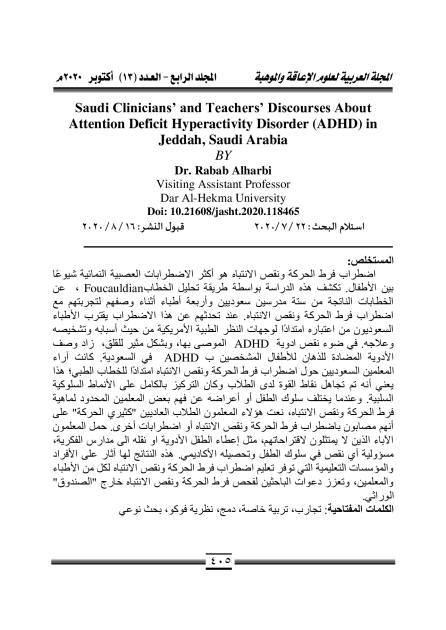Saudi Clinicians’ and Teachers’ Discourses About Attention Deficit Hyperactivity Disorder (ADHD) in Jeddah, Saudi Arabia

- Rabab Alharbi
The Arab Journal of Disability and Talent Sciences
10.21608/JASHT.2020.118465Abstract
ADHD is the most commonly diagnosed neurobehavioral disorder among children. Using Foucauldian discourse analysis, this study uncovers the discourses drawn upon by six Saudi teachers and four clinicians as they describe their experiences and understanding of ADHD. Saudi clinicians approach ADHD as an extension of American medical views in terms of its causes, diagnosis and treatment. Alarmingly, in light of the shortage of recommended ADHD medications, there are accounts of antipsychotic medications being prescribed for children. Saudi teachers views of ADHD were an extension of the medical discourse; this meant that students strengths were ignored and the focus was entirely on negative behavioral patterns. Despite the tendency to attribute ADHD to genetics, teachers objectified students who acted out’ as having ADHD or even other disorders (when the child’s behavior or symptoms diverged from their limited understanding of ADHD).
Parents who do not comply with teachers’ suggestions are blamed for any lack of improvement in the child’s behavior and academic attainment. These findings have implications for individuals and institutions providing ADHD education to both doctors and teachers, and reinforce calls for researchers to examine ADHD outside of the genetic ‘box’.
اضطراب فرط الحرکة ونقص الانتباه هو أکثر الاضطرابات العصبية النمائية شيوعًا بين الأطفال. تکشف هذه الدراسة بواسطة طريقة تحليل الخطاب Foucauldian، عن الخطابات الناتجة من ستة مدرسين سعوديين وأربعة أطباء أثناء وصفهم لتجربتهم مع اضطراب فرط الحرکة ونقص الانتباه. عند تحدثهم عن هذا الاضطراب يقترب الأطباء السعوديون من اعتباره امتدادًا لوجهات النظر الطبية الأمريکية من حيث أسبابه وتشخيصه وعلاجه. في ضوء نقص ادوية ADHD الموصى بها، وبشکل مثير للقلق، زاد وصف الأدوية المضادة للذهان للأطفال المشخصين ب ADHD في السعودية. کانت آراء المعلمين السعوديين حول اضطراب فرط الحرکة ونقص الانتباه امتدادًا للخطاب الطبي؛ هذا يعني أنه تم تجاهل نقاط القوة لدى الطلاب وکان الترکيز بالکامل على الأنماط السلوکية السلبية. وعندما يختلف سلوک الطفل أو أعراضه عن فهم بعض المعلمين المحدود لماهية فرط الحرکة ونقص الانتباه، نعت هؤلاء المعلمون الطلاب العاديين “کثيري الحرکة” على أنهم مصابون باضطراب فرط الحرکة ونقص الانتباه أو اضطرابات أخرى. حمل المعلمون الآباء الذين لا يمتثلون لاقتراحاتهم، مثل إعطاء الطفل الأدوية او نقله الى مدارس الفکرية، مسؤولية أي نقص في سلوک الطفل وتحصيله الأکاديمي. هذه النتائج لها آثار على الأفراد والمؤسسات التعليمية التي توفر تعليم اضطراب فرط الحرکة ونقص الانتباه لکل من الأطباء والمعلمين، وتعزز دعوات الباحثين لفحص فرط الحرکة ونقص الانتباه خارج “الصندوق” الوراثي.
Rabab Alharbi
Visiting Assistant Professor Dar Al-Hekma University
Keywords
Experience, Special Education, Inclusion, Foucauldian theory, Qualitative research, discourseCitation
Alharbi, R. (). Saudi Clinicians’ and Teachers’ Discourses About Attention Deficit Hyperactivity Disorder (ADHD) in Jeddah, Saudi Arabia. JASHT, 4(13), 405-436, doi: 10.21608/JASHT.2020.118465
Link to this page: https://res.adhd.org.sa/doi/10.21608/JASHT.2020.118465